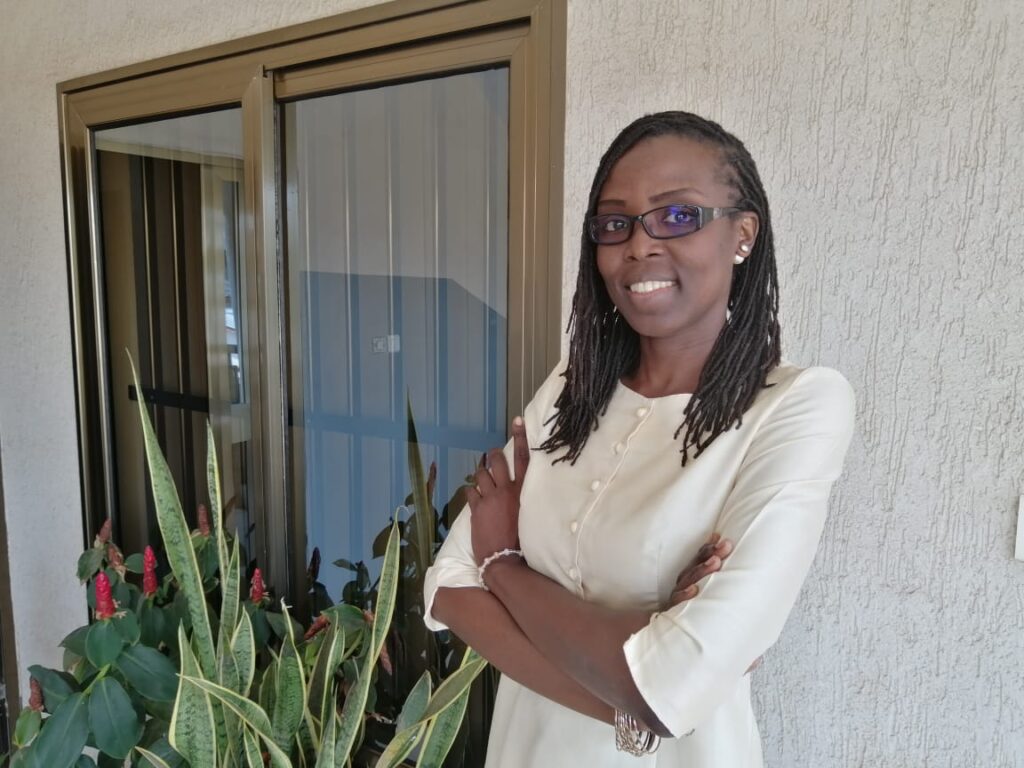In this edition of our Leadership Spotlight Series, we connect with Elodie IKO, the dynamic Country Director of The Hunger Project-Benin. As a trained psychologist specializing in gender and inclusion, Elodie brings unique insights to community development and the mindset shifts that make sustainable change possible.

1. Hi Elodie! You’re the country director of THP-Benin, but trained as a psychologist. Mindset shift is a huge part of our successful programs – how have you seen it work in practice?
2. You’re also a specialist in gender and inclusion. How do our programs incorporate these elements, and how important are they to ending hunger and poverty for the long-term?
We prioritize women and youth as key development actors because they’re vital to ending hunger and poverty sustainably. Women perform 60-80% of agricultural work in rural areas, yet remain among the most vulnerable groups. Importantly, women reinvest 90% of their income into their families (compared to 30-40% for men) – when a woman becomes independent, the entire community benefits.
Before designing any program, we conduct gender diagnoses to identify women’s specific needs. We then strengthen their capacities in food security, health, entrepreneurship, access to credit and resources, literacy, leadership, and rights awareness. We promote girls’ education and combat gender-based violence.
To ensure sustainability, we train community women facilitators and secure female representation in decision-making bodies. We also engage men, boys, and community leaders in adopting positive masculinity, promoting equality, and supporting women’s socioeconomic empowerment.
3. Tell us a little more about the THP-Benin team – how many staff do you have and where is your office based? Who has been there the longest?
THP-Benin consists of 21 multidisciplinary, dynamic staff members split between our national office in Cotonou and field locations. We maintain close connections with rural communities through project facilitators stationed in intervention zones, ensuring continuous on-the-ground support. Our most tenured team member is a driver with approximately 25 years of valuable experience at THP-Benin.
4. Can you share a community partner story that inspires or motivates you?
Faustine Ologou’s story from Ouissi epicenter deeply inspires me. In a community where women were traditionally limited to domestic roles, Faustine emerged as a transformative leader through THP-Benin’s support. After receiving training in leadership and governance, she broke barriers by being elected president of the Ouissi epicenter despite significant male resistance and political opposition.
Her determination didn’t stop there. After THP-Benin’s withdrawal, she mobilized new partners to continue nutrition programs for children under five and supported breast and cervical cancer awareness. She even secured funding for an orphanage and now supports a local kindergarten while sharing her experiences with other communities.
5. What are three facts you’d like people in Australia to know about Benin?
Benin is the birthplace of Vodoun, a profound spirituality often misunderstood through stereotypes. This animist religion spread globally through enslaved people to Haiti, Brazil, and the southern US. In Ouidah, once the main port for the slave trade in the Gulf of Benin, stands the “Door of No Return” monument commemorating this painful history.
Ganvié, known as the “Venice of Africa,” is one of the world’s largest stilt villages. It originated in the 18th century when people built homes on Lake Nokoué to escape slave raids. Since 1996, this unique settlement has been on UNESCO’s tentative World Heritage list.
Before colonisation, Benin comprised multiple kingdoms, with the Kingdom of Abomey (Dahomey) being most powerful. It was famous for its elite female warriors, the Agojie, who were renowned for their unmatched combat skills and fearlessness. European colonizers called them the “Dahomey Amazons.” Their legacy is commemorated by the Amazone Monument in Cotonou.
6. For someone in Australia who is considering coming on the Thrive Immersion trip to Benin, what would you say to encourage them to come?
If you’re seeking an authentic and inspiring experience, Benin is perfect! This democratic West African nation offers a peaceful haven filled with hidden treasures – from breathtaking landscapes to remarkable cultural sites. You’ll discover stunning coastlines, diverse natural parks, remnants of the slave trade in Ouidah, royal palaces of Abomey, and the unique stilt village of Ganvié – truly Africa in miniature!
While our vibrant nation of 14 million faces challenges in clean water access, food security, women’s empowerment, and education, our commitment to sustainable development fuels our passion.
Join us this October to witness community development approaches that truly work, explore our rich culture, taste incredible cuisine, and experience renowned Beninese hospitality. You’ll have an unforgettable adventure that continues even after you leave.
We believe ending hunger is possible, and with your participation, we can create even greater impact. Benin awaits you with open arms!
